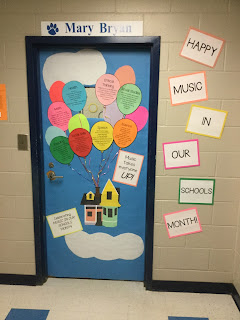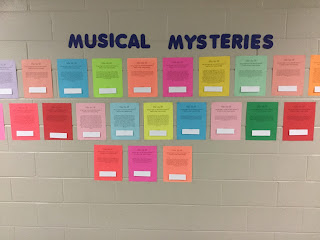Oftentimes, people wonder why music education is part of a child's education. Why do they have to learn to sing and dance? Why are they learning to read music if they probably won't ever use it again? Isn't music just a place where they can have fun and play? There are many answers to these questions, and I like to share research with those interested every now and then. If you are one of those interested, I encourage you to look into the research done with music and the brain; I promise, there is a lot! Following are just a few ways music can help your children in all other aspects of their school life, and part of why it is so important that they learn it!
Excerpt taken from Susan Hallam's "The Power of Music: Its Impact on the Intellectual, Social and Development of Children and Young People"
"
Perceptual, Language, and Literacy Skills
Speech and music have a number of shared processing systems. Musical experiences which
enhance processing can therefore impact on the perception of language which in turn impacts
on learning to read. Active engagement with music sharpens the brain’s early encoding of
linguistic sound. Eight year old children with just 8 weeks of musical training showed
improvement in perceptual cognition compared with controls.
Speech makes extensive use of structural auditory patterns based on timbre differences
between phonemes. Musical training develops skills which enhance perception of these
patterns. This is critical in developing phonological awareness which in turn contributes to
learning to read successfully.
Speech processing requires similar processing to melodic contour. Eight year old children
with musical training outperformed controls on tests of music and language.
Learning to discriminate differences between tonal and rhythmic patterns and to associate
these with visual symbols seems to transfer to improved phonemic awareness.
Learning to play an instrument enhances the ability to remember words through enlargement
of the left cranial temporal regions. Musically trained participants remembered 17% more
verbal information that those without musical training.
Children experiencing difficulties with reading comprehension have benefitted from training
in rhythmical performance.
Numeracy
Research exploring the relationships between mathematics and active musical engagement
has had mixed results, in part, because not all mathematics’ tasks share underlying processes
with those involved in music. Transfer is dependent on the extent of the match, for instance,
children receiving instruction on rhythm instruments scored higher on part-whole maths
problems than those receiving piano and singing instruction.
Intellectual Development
Learning an instrument has an impact on intellectual development, particularly spatial
reasoning. A review of 15 studies found a ‘strong and reliable’ relationship, the author
likening the differences to one inch in height or about 84 points on standardised school tests.
A study contrasting the impact of music lessons (standard keyboard, Kodaly voice) with
drama or no lessons found that the music groups had reliably larger increases in IQ. Children
in the control groups had average increases of 4.3 points while the music groups had
increases of 7 points. On all but 2 of the 12 subtests the music group had larger increases than
control groups.
General Attainment and Creativity
There is a consistent relationship between active engagement in music and general attainment
but much research has been unable to partial out confounding factors. A recent study,
adopting more sensitive statistical modelling overcame these difficulties. Two nationally
representative data sources in the USA with data from over 45,000 children found that
associations between music and achievement persisted even when prior attainment was taken
into account.
Music participation enhances measured creativity, particularly when the musical activity
itself is creative, for instance, improvisation.
Personal and Social Development
General attainment may be influenced by the impact that music has on personal and social
development. Playing an instrument can lead to a sense of achievement; an increase in selfesteem;
increased confidence; persistence in overcoming frustrations when learning is
difficult; self-discipline; and provide a means of self-expression. These may increase
motivation for learning in general thus supporting enhanced attainment.
Participating in musical groups promotes friendships with like-minded people; selfconfidence;
social skills; social networking; a sense of belonging; team work; self-discipline;
a sense of accomplishment; co-operation; responsibility; commitment; mutual support;
bonding to meet group goals; increased concentration and provides an outlet for relaxation.
Research in the USA on the benefits of band participation found that 95% of parents believed
that participation in band provided educational benefits not found in other classrooms.
Working in small musical groups requires the development of trust and respect and skills of
negotiation and compromise.
In adolescence music makes a major contribution to the development of self-identity and is
seen as a source of support when young people are feeling troubled or lonely.
3
Music has been linked to the capacity to increase emotional sensitivity. The recognition of
emotions in music is related to emotional intelligence.
Increasing the amount of classroom music within the curriculum can increase social cohesion
within class, greater self-reliance, better social adjustment and more positive attitudes,
particularly in low ability, disaffected pupils.
The positive effects of engagement with music on personal and social development will only
occur if, overall, it is an enjoyable and rewarding experience. The quality of the teaching, the
extent to which individuals perceive that they are successful, and whether in the long term it
is a positive experience will all contribute to the nature of any personal or social benefits.
Physical Development, Health and Wellbeing
Rhythmic accompaniment to physical education enhances the development of physical skills.
Learning to play an instrument enhances fine motor co-ordination.
There may be particular health benefits for singing in relation to the immune system,
breathing, adopting good posture, improved mood, and stress reduction. The research has
been carried out with adults but these benefits could equally apply to children."
For more, read the whole study at:
http://www.artiealmeida.com/resources/Power%20of%20Music-Hallam.pdf

















